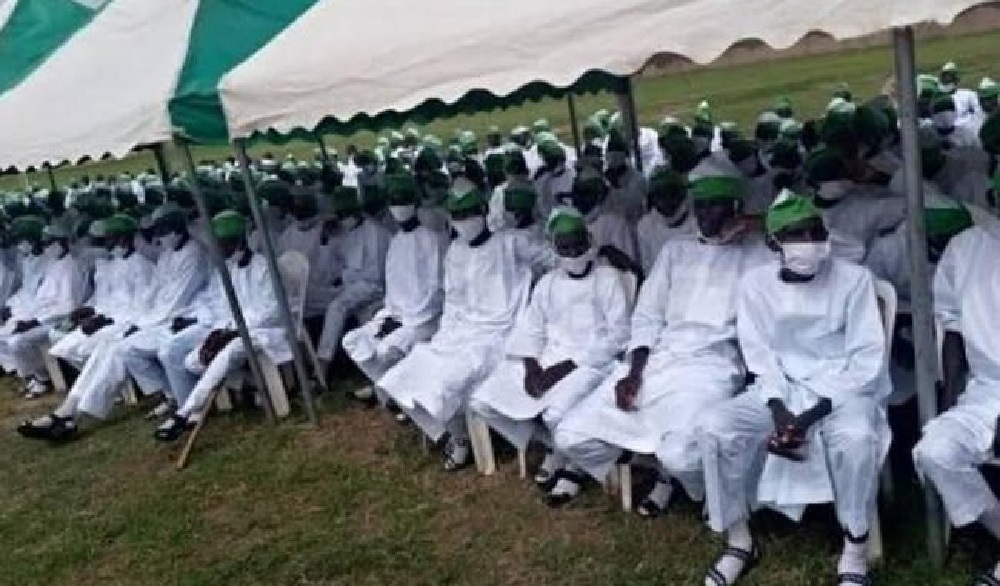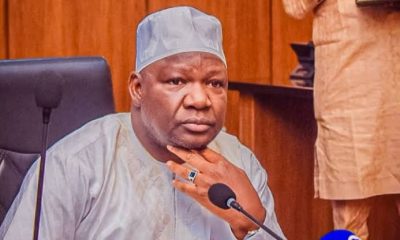News
Gynaecologists fear reduction in antenatal attendance over fuel price hike

By Francesca Hangeior
Gynaecologists have expressed concern that the recent hike in fuel prices could significantly reduce antenatal attendance among pregnant women across the country.
The maternal health experts have warned that low antenatal attendance could lead to poor pregnancy outcomes due to a lack of supervision and specialist care.
The physicians further expressed worry that the hike in fuel prices could exacerbate Nigeria’s already troubling maternal health indices, highlighting that effective antenatal, intrapartum, and postpartum care were crucial in averting maternal mortality.
The hardship, which started after the removal of fuel subsidy and devaluation of the naira, was exacerbated on Wednesday when the pump price of fuel jumped from around N800 to N1,150 per litre.
This has led to increased transport fares nationwide and worsening the hardships faced by Nigerians.
The gynaecologists disclosed that the new fuel pump price would certainly impact antenatal attendance, stating that pregnant women with low income would not be regular with their appointments due to high transport fares.
The World Health Organisation’s new guidelines recommend at least eight antenatal visits during pregnancy, emphasising that care should begin within the first trimester.
According to the 2018 National Demographic and Health Survey, Nigeria has a worrisome maternal mortality ratio of 512 deaths per 100,000 live births.
Speaking exclusively with PUNCH Healthwise in different interviews, the gynaecologists expressed concern that reduced antenatal attendance would prevent many expectant mothers from receiving necessary interventions.
Dr Chukwuneme Okpala
A Consultant Obstetrician and Gynaecologist at Nnamdi Azikiwe University Teaching Hospital in Nnewi, Anambra State, Dr Chukwuneme Okpala, warned that the recent fuel price hike would lead to decreased antenatal attendance.
He explained that the initial increase in fuel prices had already raised transportation costs, and the latest hike had further worsened the situation, making it difficult for many pregnant women to keep to their appointments.
Okpala stated, “Hospitals will see a decline in antenatal care attendance in Nigeria due to the rising fuel cost. High transportation costs will have a ripple effect on people’s living standards, reducing the purchasing power of pregnant women.
“Many will struggle to afford basic needs, which will inevitably affect their ability to attend appointments. When finances are tight, families will have to prioritise essentials like food over healthcare, leading to fewer women attending routine antenatal services.
“Many women will not visit the hospital regularly for antenatal care due to financial constraints, regardless of their proximity to healthcare facilities.”
Okpala stressed that irregular attendance at antenatal clinics could lead to poor quality care, significantly impacting pregnancy outcomes.
“Without regular visits, those who need interventions may not receive them. Attending antenatal clinics frequently increases the chances of detecting and managing potential complications.
“Only through hospital visits can healthcare providers assess and identify any issues, whether maternal or foetal. When women do not present or arrive late, it often results in more severe problems that could have been addressed earlier”, he said.
Okpala lamented that decreased antenatal attendance will exacerbate Nigeria’s maternal health indices.
“If the current hardships persist, our maternal health statistics will suffer. In 2023, the WHO reported that Nigeria has the second highest rates of maternal, stillbirth, and neonatal deaths in the world, following India,” he said.
The expert explained that maternal mortality serves as an indirect measure of a country’s Gross Domestic Product, adding, “If our GDP declines, healthcare will be adversely affected. Preventing maternal mortality relies on proper antenatal, intrapartum, and postpartum care.
“If women begin to seek alternative care due to high transportation costs, our maternal mortality rates will undoubtedly rise. While the effects may not be immediately visible, they will become apparent if the current trend continues without intervention.”
Offering recommendations, Okpala stated that the government was aware of the necessary actions to take, as many professionals have provided potential solutions.
He said, “The government has two options: either reinstate the fuel subsidy and tackle corruption or refine our fuel and sell it reasonably. Alternatively, they could establish an affordable public transport system for antenatal mothers, enabling them to attend their appointments.”
He emphasised that such measures could lead to positive pregnancy outcomes, asserting, “The responsibility lies with the government, not individuals. If they implement these changes, it would help, but I remain sceptical about their willingness to do so.
“Our government travels abroad and observes how things work there. If we can enhance purchasing power, we will access quality care; if purchasing power decreases, the outcomes will suffer.”
He said, “If a person earns N100,000 and that amount remains unchanged over time, their quality of care, as well as the quality of food they can afford, will decline.
“Consequently, the amount they can allocate for healthcare will also decrease. The government knows what needs to be done, but corruption often hinders these efforts.”
Corroborating Okpala’s statement, a Consultant Obstetrician and Gynaecologist at the Niger Delta University Teaching Hospital in Bayelsa State, Dr Judiet Ugbechie, emphasised that reduced antenatal attendance increases the risk of pregnancy complications.
She noted that higher numbers of antenatal visits are crucial for decreasing the likelihood of stillbirths and improving pregnancy outcomes.
Ugbechie said, “Having eight or more contacts for antenatal care can significantly reduce perinatal deaths compared to having only four visits or none at all.
“A woman’s visit to her antenatal care provider should encompass more than just a routine check-up; it should involve comprehensive care and support throughout the pregnancy.”
She highlighted that more frequent and higher-quality visits between women and their healthcare providers facilitate the uptake of preventive measures, timely detection of risks, and address health inequalities.
“Antenatal care is particularly vital for first-time mothers, as it sets the foundation for how they will engage with antenatal care in future pregnancies,” she said.
She recommended that pregnant women schedule their first antenatal visit within the first 12 weeks of gestation, followed by subsequent visits at 20, 26, 30, 34, 36, 38, and 40 weeks.
News
Four SANs join Agabi to defend Nnamdi Kanu

Indigenous People of Biafra (IPOB) leader Mazi Nnamdi Kanu has added four Senior Advocates of Nigeria (SANs) to his defence team.
The additions bring the number of SANs on the team to six.
In addition to Chief Kanu Agabi (SAN) and Uchenna Njoku (SAN), the new SANs are Prof Onyechi Ikpeazu, Emeka Etiaba, Mela Audu Nunghe and Dr. Joseph Akubo.
They will all be in court today as well as on May 2 and 6 as Kanu’s trial continues.
A member of Kanu’s legal team, Aloy Ejimakor, provided the update via his verified X handle @AloyEjimakor.
The Federal Government on March 21 re-arraigned Kanu before Justice James Omotosho on a fresh seven-count charge bordering on terrorism.
Kanu apologised for his February 10 verbal attack on Justice Binta Nyako, who recused herself from the case.
The IPOB leader said Justice Nyako “did not deserve the unjust attack.”
He tendered his apologies through Agabi, a former Attorney General of the Federation and Justice Minister.
The SAN attributed Kanu’s outburst to anger and urged everyone to forgive him.
“He has been angry for a long time and therefore he should not have spoken when he was angry,” Agabi said.
News
Borno govt reintegrates 300,000 former Boko Haram terrorists

Borno State Governor, Babagana Zulum, has disclosed that the state has reintegrated no fewer than 300,000 repentant Boko Haram terrorists over the past three years.
Governor Zulum made the revelation while receiving the Minister of Defence, Badaru Abubakar; the Chief of Defence Staff, Gen. Christopher Musa; and other top military commanders during their visit to Maiduguri.
“Borno State has, within the last three years, received more than 300,000 repentant Boko Haram fighters — and not all of them are fighters. Some of them are farmers,” he said.
While acknowledging the efforts of the Nigerian military, the governor noted that several challenges continue to hamper the effective fight against terrorism and called for urgent interventions.
He stressed the importance of combining kinetic and non-kinetic approaches in the ongoing counterterrorism efforts.
“Manpower is very essential. While I’m aware of the constraints of the Nigerian Army — because right now, you are everywhere in Nigeria: the North-East, North-West, North Central, as well as southern Nigeria — I’m aware of your limitations,” he said.
“But still, considering the northeastern region, the Nigerian Army should look into the possibility of sending more trained manpower. There is a difference between Boko Haram, ISWAP, and bandits.”
Governor Zulum further warned of the growing external support for terrorist groups operating in the region.
“ISWAP and Boko Haram are terrorists getting support internationally, and looking at our porous borders, they remain infiltrated through the Sahel, which is our major problem.”
He emphasised the strategic importance of securing the Sahel to achieve lasting peace across Nigeria.
“If the Sahel is not secured, Nigeria will never be secured. So, there is a need for us to fortify the security situation in the Sahel with a view to ending the crisis in the entire nation.”
The governor also called for enhanced air capabilities to counter the evolving threats posed by terrorist groups.
“We need air support. I know the kind of constraints you face accessing fighter helicopters and others, but attack helicopters are very important in these areas, and drones are also very important.”
Highlighting recent developments, he said: “The last attack that happened in Wulgo, carried out by ISWAP and Boko Haram — a confirmed statement said it was carried out with the support of armed drones. They hit the MNJTF (Multinational Joint Task Force) with drones.
“This is the time for the Nigerian military to rise again and procure sophisticated drones and anti-drone equipment so that we get rid of these problems.”
Governor Zulum described the situation as a serious setback not only for Borno State but for the entire Northeast region.
News
Court orders Aisha Achimugu to appear before EFCC today

Justice Iyang Ekwo of the Federal High Court in Abuja, has ordered Aisha Achimugu to appear before the Economic and Financial Crimes Commission (EFCC) on Tuesday (today) to answer questions regarding an ongoing investigation.
The judge also directed that she must appear before the court on Wednesday, April 30, 2025.
The gave the order in a ruling he delivered on Monday, April 28, 2025, in respect of a suit marked FHC/ABJ/CS/626/2025, filed by Achimugu against several law enforcement agencies, including the Nigeria Police Force, the Independent Corrupt Practices and Other Related Offences Commission (ICPC) the Department of State Services (DSS), the EFCC, the Nigeria Security and Civil Defence Corps (NSCDC) and the Nigeria Immigration Service (NIS).
In its response to Achimugu’s application, lawyer to EFCC, Ekele Iheanacho (SAN), informed the court of a counter-affidavit deposed to by one of its investigators, Chris Odofin, outlining the circumstances leading to her invitation.
In the affidavit, Odofin disclosed that Achimugu is under investigation for alleged conspiracy, obtaining money by false pretence, money laundering, corruption and possession of property reasonably suspected to have been acquired through unlawful means.
Achimugu had initially honoured the Commission’s invitation on February 12, 2024, during which she made a written statement and was subsequently granted administrative bail through her lawyer and surety, Darlington N. Ozurumba.
But she allegedly failed to report back as agreed, choosing instead to file a fundamental rights enforcement suit against the Commission.
The affidavit further revealed that Achimugu, in her statement, explained the inflow of N8.71billion into her corporate bank accounts as an ” investment fund” for the acquisition of an oil block.
She claimed the funds were transferred to the Federal Government’s account through her company, Oceangate Engineering Oil and Gas Limited, referencing documentation from the Nigerian Upstream Petroleum Regulatory Commission, NUPRC.
Further investigation in the affidavit however, indicated that Achimugu’s company actually acquired two oil blocks, Shallow Water PPL 3007 and Deep Offshore PPL 302-DO at the cost of $25.3 million.
Investigations showed that the payments were allegedly made in cash via bureau de change operators and that the ultimate sources of the funds could not be traced to any legitimate business income or partnerships.
The Commission also alleged that the acquisition process was fraught with corruption. Despite the acquisition, neither of the two oil blocks had commenced exploration or production as of the time of investigation.
The EFCC stressed that Achimugu’s current suit is a calculated attempt to frustrate the ongoing investigation, despite a previous court decision in suit No. FHC/ABJ/CS/451/2024 dismissing her claim of fundamental rights violations.
Following the dismissal of the earlier suit, the EFCC continued its investigation by dispatching inquiry letters to various banks and the Corporate Affairs Commission (CAC), the Federal Inland Revenue Services (FIRS), Land Authorities, Special Control Unit against Money Laundering (SCUML), Central Bank of Nigeria (CBN) to gather more evidence. As more responses were received, the team analysed them while further responses are being awaited.
The affidavit also shows that Aisha Achimugu operates a total of 136 bank accounts across 10 different banks both in her personal and corporate names.
The case continues on Wednesday, April 30, 2025 with Achimugu expected to report to the EFCC on Tuesday as directed by the court.
-

 News18 hours ago
News18 hours agoInsecurity: BUDA urges govt to quickly rescue Baruten from terrorists
-

 News24 hours ago
News24 hours agoJust in: Senator Natasha tenders satirical ‘apology’ to Akpabio
-

 News20 hours ago
News20 hours agoUNUSUAL! Without invitation, Police declared me wanted — Daughter of ABC Transport owner
-

 News15 hours ago
News15 hours agoBreaking: Late gospel singer Osinachi’s husband sentenced to death by hanging
-

 News17 hours ago
News17 hours agoWeeks to 2nd anniversary, Niger deputy gov, plans to resign, move out personal effects
-

 News22 hours ago
News22 hours agoGov Oborevwori’s top aide suddenly resigns from govt
-

 Entertainment20 hours ago
Entertainment20 hours agoMy tongue slipped, Annie Macaulay apologizes after referring to Herself as ‘Idibia’ at Headies 2025
-

 News14 hours ago
News14 hours agoVatican: Conclave to elect a new pope will start on May 7






